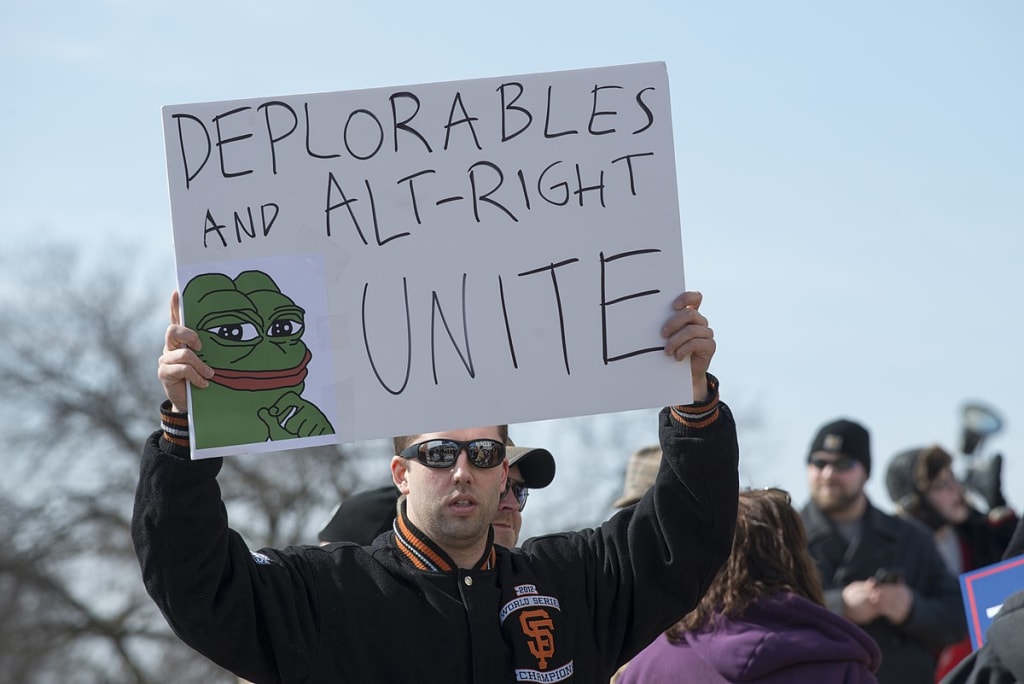People are Struggling to See the Danger of the Right
Increasing support for the alt-right movement following success of populist leaders—people are somehow attracted to this abusive and misguided faction of socio-culture.

Worryingly, I have seen more and more people aligning themselves, knowingly or not, with views of the alt-right movement, often indirectly supporting the views of Trump. There’s a lot of reason to want to be part of a seemingly anti-establishment movement and it’s important to understand the reasons for the rise of populism, but people seem too often to just be misdirecting their confusion to support public figures like Milo Yiannopoulos, because people like this appear to have a strong message and confidence, which is understandably attractive at a time of political and social turmoil.
For example, the recent rise of the alt-right movement, which has materialised most dangerously in the US, seems to be based essentially on anger and misinformation. It is understandable that people are angry but in general, people must try harder to educate themselves independently on both sides of the political argument before wildly associating themselves with extremism. The mildest form of supporting right wing extremism, albeit still legitimising its cause, is simply sharing/liking or promoting an associated group on social media, in some way or another. I am in no way opposed to using social media as a platform for freedom of speech and in fact, this is one of many benefits of online socialisation—it encourages political participation, it can educate and involve young people especially as well as the apathetic electorate. But in the case of ideological extremism, it allows users too easily to (sometimes) unwittingly associate themselves with often quite a harsh political alignment that they perhaps don’t generally support.
Milo Yiannnopoulos recently shared a video on Facebook of a Trump supporter amongst protesters at a women’s rally telling a reporter that he doesn’t understand why there is a protest the day following the inauguration of a legitimately elected president. Firstly, the supporter had, from the start, misunderstood the motive of the march—no one at the rally was claiming Trump’s election was illegal—it was nothing to do with this—despite the clear problems with the electoral system. The reason for the Women’s March was to protest the obvious and arguably most dangerous ideas that Trump stands for as a racist and a sexist. So from the beginning, this voter didn’t recognise the reasons for the Women’s March on Trump (labelled as a march "on Trump," not on the basis of how he was elected, but on the basis of citizens upholding their moral values and fighting against everything wrong and unpresidential about Trump—too much to list at once).
Secondly, even if the peaceful rally this man found himself at was made up of people challenging the legitimacy of Trump’s election, rightly so. Clinton won 2.8 million more votes than Trump—protesting the inadequacy of the US electoral system would make complete sense. This is not to say that I believe a Hillary Clinton presidency would be good for American society either, but that’s not the point.
Despite the importance of understanding current populist support levels both in Europe and the US rather than simply dismissing voters categorically, it can be difficult to sympathise with right wing populists in the case of Trump’s agenda because he is so blatantly racist, sexist, arrogant and self-serving. Understanding high working-class support for populist leaders is essential in overcoming elitism and hierarchical inequalities in both the US and UK; but it is challenging to sympathise with voters who don’t seem to understand why comments like “grab her by the pussy” and “Mexicans are bringing criminals and they’re rapists” are so demeaning, dangerous and offensive. Even voters who truly believe Trump’s rhetoric about protecting workers and agree with some of his less extreme views, on principle should see that his discrimination against basically anyone who's not a white middle-class male overrides in importance his more moderate views. Surely on the basis of his bigotry alone, he should be seen as unelectable? But for some reason, this wasn’t that important to enough voters in the US in 2016.






Comments
There are no comments for this story
Be the first to respond and start the conversation.